-
REVIEW
Research methodology for nursing and health: a book review
Revista Brasileira de Enfermagem. 2016;69(5):1000-1001
01-01-2016
Abstract
REVIEWResearch methodology for nursing and health: a book review
Revista Brasileira de Enfermagem. 2016;69(5):1000-1001
01-01-2016DOI 10.1590/0034-7167-2015-0135
Views0For those interested in nursing and health, the book entitled “Research methodology for nursing and health: from theory to practice”() was released in October 2015, at the 67th Brazilian Congress of Nursing, sponsored by National ABEn. The interest emerged from two organizers: Dr. Maria Ribeiro Lacerda (UFPR) and Dr. Regina Gema Santini Costerano (UNIFRA). Forty-seven […]See more -
REFLECTION
Violence in the workplace in Nursing: consequences overview
Revista Brasileira de Enfermagem. 2016;69(5):996-999
01-01-2016
Abstract
REFLECTIONViolence in the workplace in Nursing: consequences overview
Revista Brasileira de Enfermagem. 2016;69(5):996-999
01-01-2016DOI 10.1590/0034-7167-2015-0133
Views0See moreABSTRACT
Objective:
to reflect on the consequences of workplace violence experienced by nursing professionals.
Methods:
this is a reflection paper based on recent publications related to the subject, particularly researches carried out in Brazil and in other countries.
Results:
exposure to workplace violence has been associated with health problems in nursing professionals, which may be physical damage, emotional manifestations, and psychic disorders. It also affects the employee performance, his or her family and social interactions.
Conclusion:
this phenomenon is potentially noxious and costly, for it leads to suffering, illness, absence from work, and even death. This reflection calls attention moreover to the importance of a safe and adequate health care work environment.
-
REFLECTION
Construcción de la enfermera de práctica avanzada en Catalunya (España)
Revista Brasileira de Enfermagem. 2016;69(5):991-995
01-01-2016
Abstract
REFLECTIONConstrucción de la enfermera de práctica avanzada en Catalunya (España)
Revista Brasileira de Enfermagem. 2016;69(5):991-995
01-01-2016DOI 10.1590/0034-7167.2016690507
Views0RESUMEN
El desarrollo de la enfermera de práctica avanzada (EPA) ha supuesto un reto para las enfermeras en países como EE.UU., Canadá, Gran Bretaña y Australia, entre otros, y desde hace escasos años está siendo considerada en Catalunya y España como un sistema para desarrollar nuevos roles que aporten eficacia y eficiencia al sistema sanitario. El presente artículo pretende conceptualizar la EPA y los modelos de referencia así como contextualizar y reflexionar sobre la EPA en Catalunya, desde el punto de vista de formación y de la implantación de los denominados nuevos roles de enfermería, asimilándolos a la práctica avanzada.
Keywords:Competencia ClínicaEnfermeríaEnfermería de Práctica AvanzadaPráctica ProfesionalRol de la EnfermeraSee more -
REFLECTION
Developing the Advanced Practice Nurse in Catalonia
Revista Brasileira de Enfermagem. 2016;69(5):991-995
01-01-2016
Abstract
REFLECTIONDeveloping the Advanced Practice Nurse in Catalonia
Revista Brasileira de Enfermagem. 2016;69(5):991-995
01-01-2016DOI 10.1590/0034-7167.2016690507
Views0See moreABSTRACT
The development of advanced practice nurses (APN) has proved a challenge for nurses in countries such as the USA, Canada, Great Britain, and Australia among others. It is only in recent years that the system has been considered in Catalonia and Spain as a way to develop new roles to bring effectiveness and efficiency to the health system. From the standpoint of training and implementation of the above-mentioned new nursing roles, the following article aims to conceptualise APN and its reference models, as well as to contextualise and reflect on APN in Catalonia in order to assimilate them into advanced practice.
-
EXPERIENCE REPORT
International academic mobility in nursing education: an experience report
Revista Brasileira de Enfermagem. 2016;69(5):986-990
01-01-2016
Abstract
EXPERIENCE REPORTInternational academic mobility in nursing education: an experience report
Revista Brasileira de Enfermagem. 2016;69(5):986-990
01-01-2016DOI 10.1590/0034-7167-2015-0128
Views0See moreABSTRACT
Objective:
report the experience of international academic mobility in Ireland through the program Science Without Borders during undergraduate education in nursing.
Method:
a report of experience presented in chronological order, with a descriptive nature.
Results:
the opportunity to know and be able to discuss questions regarding health and nursing in Ireland allowed the review of concepts and a more reflective perspective regarding nursing practices. Additionally, the exchange promoted personal strengthening regarding the confrontation and solution of problems, development of technical and scientific abilities, improvement of linguistic competences and construction of personality, independence and maturity.
Conclusion:
regarding such constructive and enriching experience that this mobility provides to students, to the governing authorities, to the population and to Brazilian nursing, sharing this experience is expected to serve as encouragement for those who search for new horizons, with the objective of adding knowledge for their personal and professional life.
-
EXPERIENCE REPORT
Online training for health professionals in three regions of Brazil
Revista Brasileira de Enfermagem. 2016;69(5):981-985
01-01-2016
Abstract
EXPERIENCE REPORTOnline training for health professionals in three regions of Brazil
Revista Brasileira de Enfermagem. 2016;69(5):981-985
01-01-2016DOI 10.1590/0034-7167.2016690506
Views0See moreABSTRACT
Objective:
to describe online training experience aimed at professionals working in the public health service in 27 Neonatal and Pediatric Intensive Care Units, and to reflect concerning the training process and possible improvements in this process.
Method:
this is an experience report study about the online training with multidisciplinary content, planned from the situational diagnosis of 27 institutions. The training target set was 10 participants per institution and per module, including the following topics: Indicators of Quality as a Management Tool, Hand Hygiene, Patient Safety, Intravenous Therapy and Patients’ Chart Record.
Results:
a total of 2,071 active students in the modules, with 1,046 approved. The mean of 76 students per module exceeded the target set.
Conclusion:
experience has shown that online training is comprehensive as a potential tool for the professional technical development and digital inclusion. The online learning system becomes weakened if participants are unaware of the technological resources.
-
REVIEW
Technologies in intensive care: causes of adverse events and implications to nursing
Revista Brasileira de Enfermagem. 2016;69(5):972-980
01-01-2016
Abstract
REVIEWTechnologies in intensive care: causes of adverse events and implications to nursing
Revista Brasileira de Enfermagem. 2016;69(5):972-980
01-01-2016DOI 10.1590/0034-7167.2016690505
Views0See moreABSTRACT
Objective:
to identify the causes of adverse events affecting clients resulting from the use of equipment in intensive care services; to point out the main recommendations for clinical practice to minimize these events and, then, discuss the implications to nursing care.
Method:
integrative and descriptive review on the SciELO, Medline, LILACS, and PubMed databases. Articles were selected based on the inclusion criteria and the structured instrument was applied.
Results:
altogether, 11 articles were selected where three evidence units were outstanding: Equipment failure; inadequate use of equipment; and team failure. Permanent education of professionals; evaluation of production and availability of equipment; and use of checklists are recommended.
Conclusion:
preventing adverse events related to equipment is one of the nursing responsibilities and requires the establishment of defensive barriers to prevent these.
-
RESEARCH
Leads for potentializing groups in Primary Health Care
Revista Brasileira de Enfermagem. 2016;69(5):964-971
01-01-2016
Abstract
RESEARCHLeads for potentializing groups in Primary Health Care
Revista Brasileira de Enfermagem. 2016;69(5):964-971
01-01-2016DOI 10.1590/0034-7167-2015-0102
Views0ABSTRACT
Objective:
to analyze the aspects that potentialize groups in Primary Health Care according to their coordinators and participants.
Method:
This is a descriptive study with a qualitative approach, conducted with a health promotion group affiliated with a Family Health Unit. The data were collected by means of focus groups with participants and community workers who were submitted to thematic content analysis.
Results:
the analysis gave rise to three thematic categories: The group is our medicine; Healthy living and learning; and Priceless leadership.
Conclusion:
the leads identified during the study were as follows: group organization involves investment in motivation and leadership by the coordinators; production of grouping and cohesion is a result of participants and coordinators meeting together, interspersed with dialog, things said and left unsaid that the subjects expressed in the group dynamic; the sense of belonging guarantees their placement in the group based on the recognition of their knowledge and affective, social and health needs.
Keywords:Group ProcessesGroup StructureHealth PromotionNursing in Community HealthPrimary Health CareSee more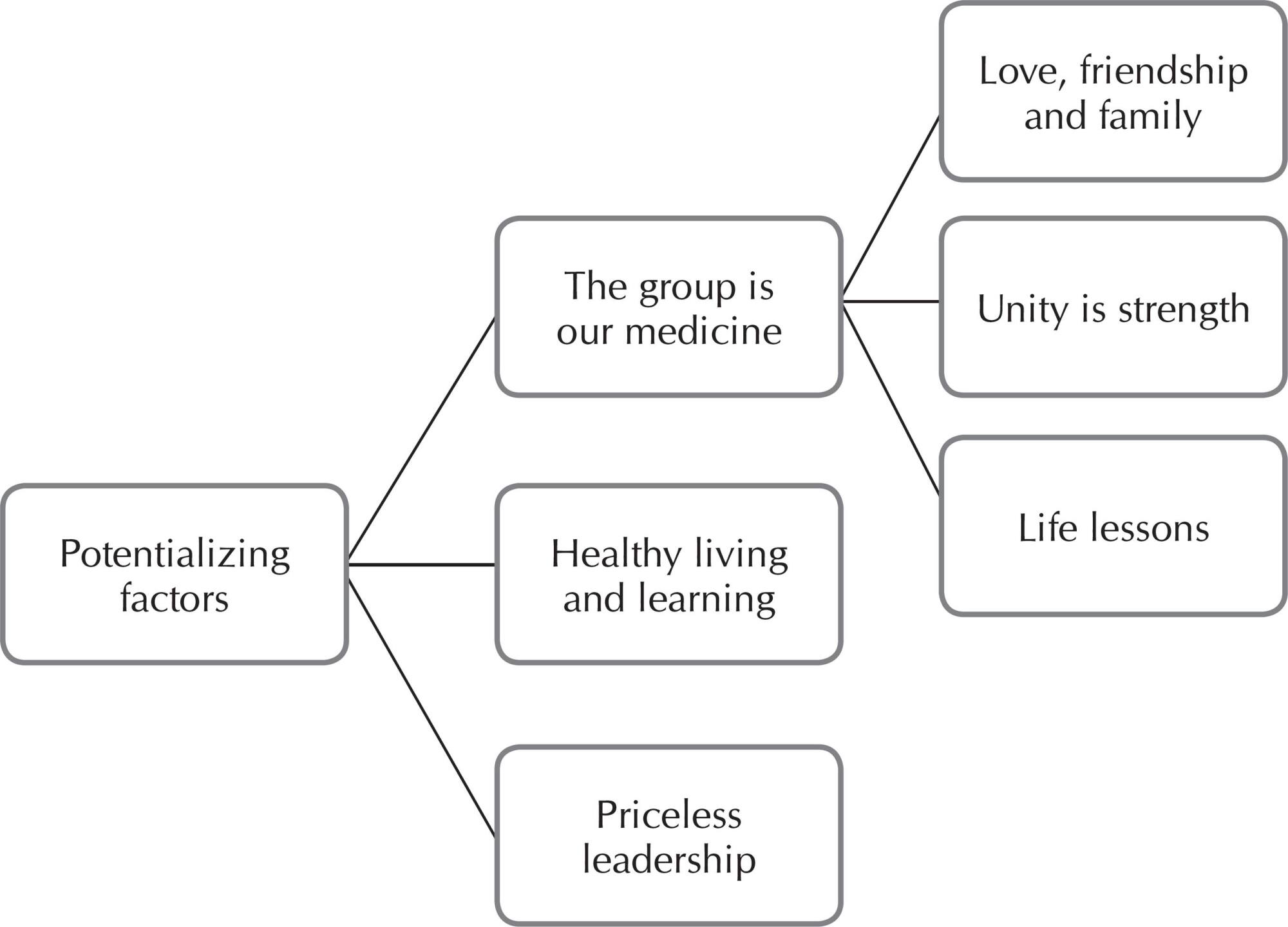
-
ORIGINAL ARTICLE
Patient safety incidents identified by the caregivers of hospitalized children
Revista Brasileira de Enfermagem. 2019;72(3):707-714
06-27-2019
Abstract
ORIGINAL ARTICLEPatient safety incidents identified by the caregivers of hospitalized children
Revista Brasileira de Enfermagem. 2019;72(3):707-714
06-27-2019DOI 10.1590/0034-7167-2018-0484
Views0See moreABSTRACT
Objective:
to analyze patient safety incidents identified by caregivers of hospitalized children.
Method:
a qualitative, exploratory-descriptive study was carried out with 40 caregivers of children hospitalized in three hospital institutions in the city of Porto Alegre, Rio Grande do Sul State, Brazil, from April to December 2016. Semi-structured, recorded and transcribed interviews were carried out in their entirety, submitted to a thematic analysis using the NVivo 11.0 software.
Results:
reports related to falls, infant feeding, patient/caregiver identification, medication process, communication, hand hygiene and hygiene of the hospital environment, spread of diseases, relations between caregivers and professionals and care processes/procedures were all cited.
Final considerations:
communication and the relations among caregivers and professionals are the main contributory factors for patient safety incidents, interfering with the quality of care. The participation of caregivers and engagement in child care may be strategies to be developed to promote a safety culture.
-
ORIGINAL ARTICLE
Tuberculosis: health care and surveillance in prisons
Revista Brasileira de Enfermagem. 2019;72(5):1304-1310
09-16-2019
Abstract
ORIGINAL ARTICLETuberculosis: health care and surveillance in prisons
Revista Brasileira de Enfermagem. 2019;72(5):1304-1310
09-16-2019DOI 10.1590/0034-7167-2018-0260
Views0ABSTRACT
Objective:
To identify tuberculosis-related health care and surveillance actions in Prison Health Units.
Method:
Cross-sectional study, of quantitative, exploratory and descriptive character. We visited 13 Teams of Prison Health, and nurses and technicians were interviewed regarding epidemiological surveillance instruments, physical structure and materials.
Results:
Search for respiratory symptoms in admission was reported by 6 (46.2%) of the teams, and the smear microscopy was the most requested test. The Logbook of Respiratory Symptoms and the Logbook for Monitoring Tuberculosis Cases were used in 7 (53.8%) institutions. Two of them (15.4%) had a location for sputum collection and 1 (7.7%) had a radiographer. The Directly Observed Therapy was reported in 7 (53.8%) units.
Conclusion:
Health care actions related to the search for respiratory symptoms and Directly Observed Therapy should be expanded, as well as surveillance actions and recording in official documents of the National Tuberculosis Control Program.
Keywords:Cross-Sectional StudiesDelivery of Health CarePrisonsPublic Health SurveillanceTuberculosisSee more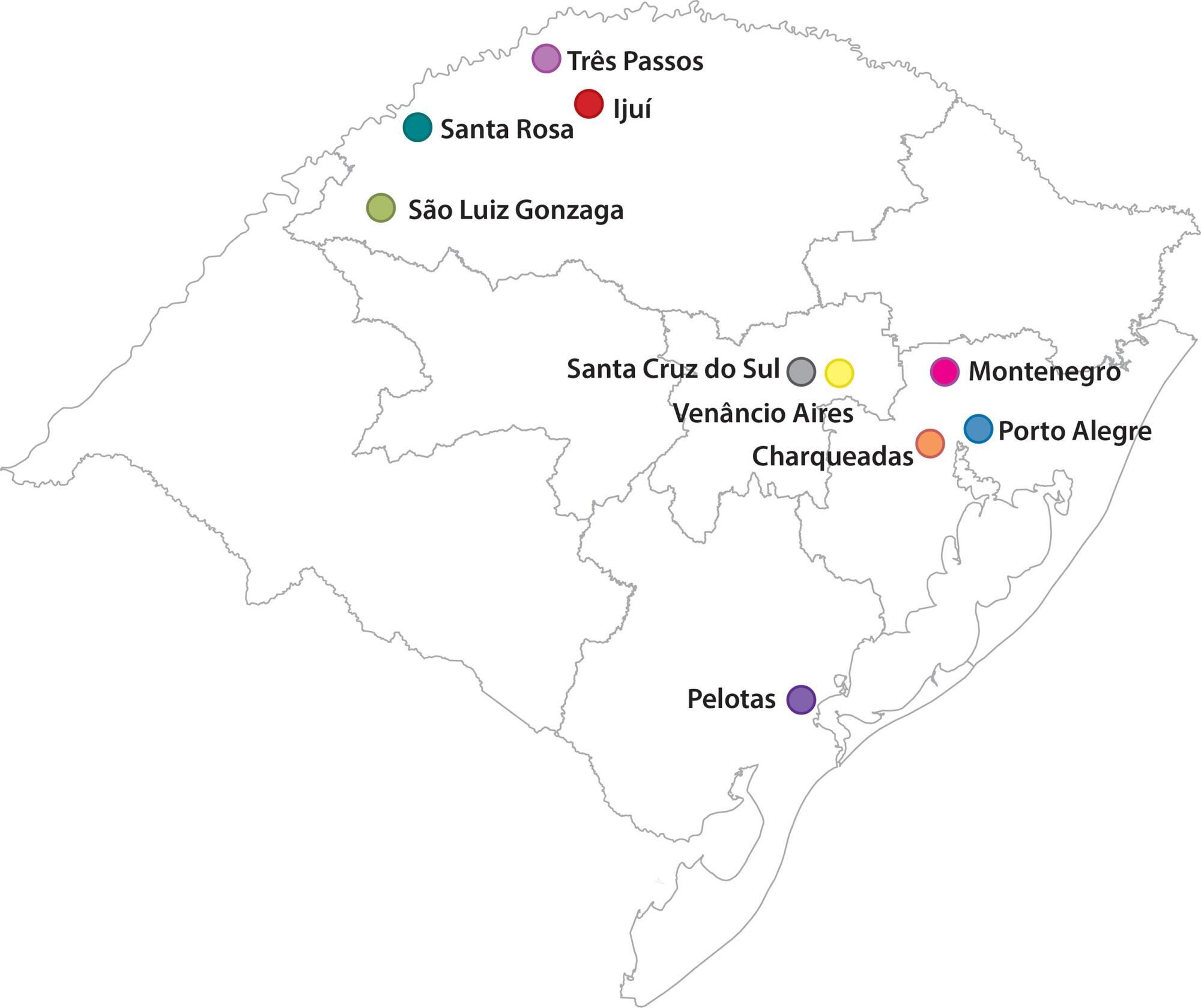
-
ORIGINAL ARTICLE
Adaptation and validation of the Advanced Practice Nursing Competency Assessment Instrument
Revista Brasileira de Enfermagem. 2022;75(5):e20210582
03-07-2022
Abstract
ORIGINAL ARTICLEAdaptation and validation of the Advanced Practice Nursing Competency Assessment Instrument
Revista Brasileira de Enfermagem. 2022;75(5):e20210582
03-07-2022DOI 10.1590/0034-7167-2021-0582
Views0ABSTRACT
Objective:
To adapt and validate the content of the Advanced Practice Nursing Competency Assessment Instrument (APNCAI) to Brazilian culture.
Methods:
This is a methodological study that followed the stages of translation, synthesis, back translation, evaluation by a committee of five specialists, pre-test with 31 nurses, and evaluation by the author of the original instrument. The Content Validity Index (minimum 0.90) and the modified Kappa (minimum 0.74) were calculated to evaluate the content.
Result:
In the first round of content evaluation, 18 items had to be altered because they did not reach the minimum values established. Three items have not reached a consensus in the second round and had to be sent to the author of the original version. In the pre-test, 13 items were returned to the specialists because they suffered content changes.
Conclusion:
The Advanced Practice Nursing Competency Assessment Instrument (APNCAI) – Brazilian version was cross-culturally adapted, and its content was validated.
Keywords:Advanced Practice NursingClinical CompetenceRole of the Nursing ProfessionalTranslationValidation StudiesSee more -
REVIEW
Frailty syndrome in the elderly: conceptual analysis according to Walker and Avant
Revista Brasileira de Enfermagem. 2020;73:e20190601
07-29-2020
Abstract
REVIEWFrailty syndrome in the elderly: conceptual analysis according to Walker and Avant
Revista Brasileira de Enfermagem. 2020;73:e20190601
07-29-2020DOI 10.1590/0034-7167-2019-0601
Views0See moreABSTRACT
Objective:
To analyze the concept of “frailty syndrome” in the literature, according to the method proposed by Walker and Avant.
Methods:
It is a concept analysis, guided by the method proposed by Walker and Avant, made operational through an integrative literature review. The search in a scientific database was carried out using the descriptors: Frail elderly, syndrome, phenotype, geriatric assessment, and aging. The literary corpus comprised 66 studies. Results: The study found the antecedents and attributes (categorized as physical, sociodemographic, and behavioral/environmental) that integrate the signs and symptoms evidenced in the “frailty syndrome,” as well as the consequences of this concept. The variables were analyzed with emphasis on the conceptions that influence the frailty process of the elderly.
Conclusion:
The study demonstrated the complexity arising from the multifactorial genesis of the referred syndrome, emphasizing the specificities of the elderly’s frailty. However, we recommend conducting further research involving the phenomenon in question to understand the construct better.
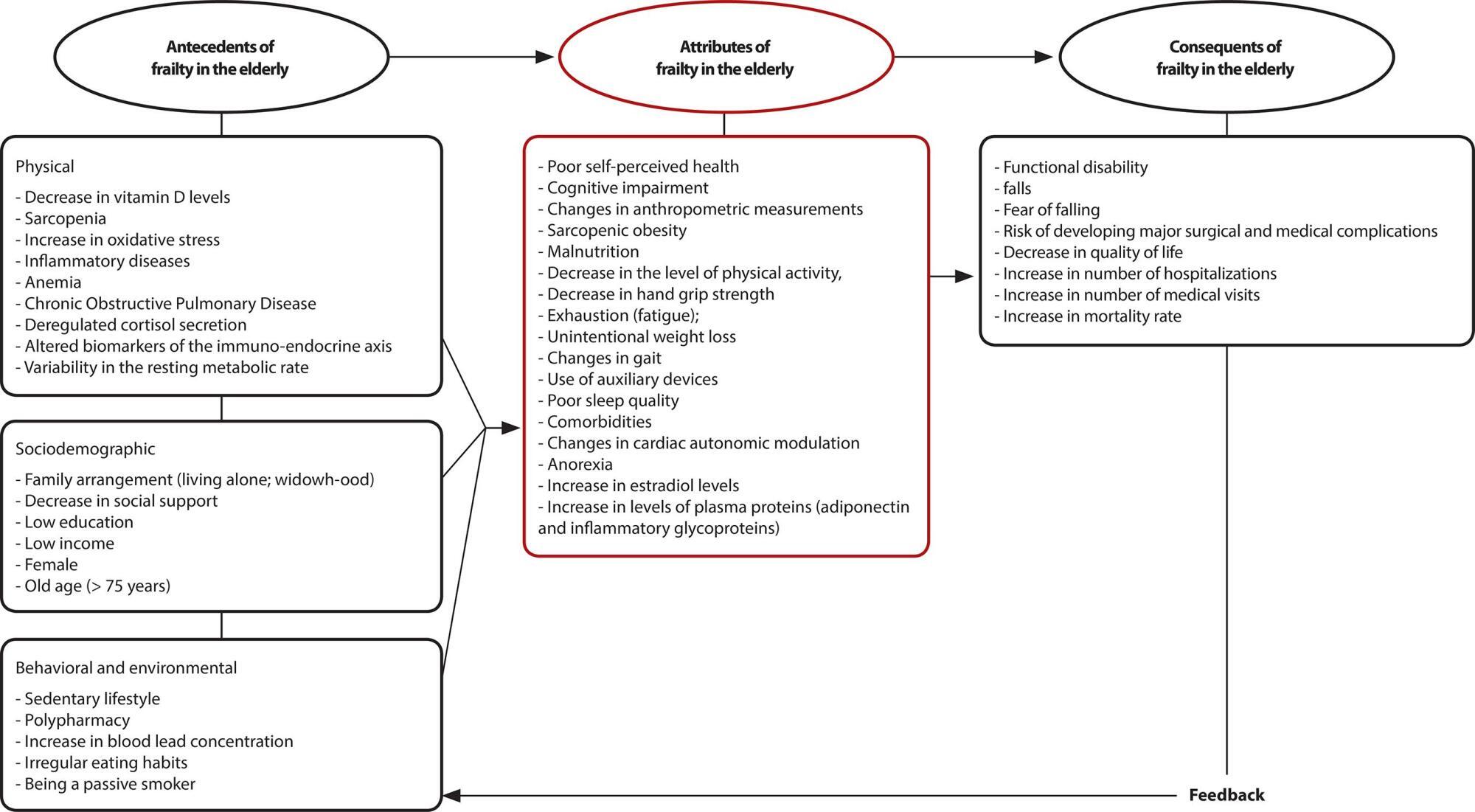
-
Construct validation: coping with HIV/AIDS in Primary Health Care
Revista Brasileira de Enfermagem. 2019;72(5):1173-1181
09-16-2019
Abstract
Construct validation: coping with HIV/AIDS in Primary Health Care
Revista Brasileira de Enfermagem. 2019;72(5):1173-1181
09-16-2019DOI 10.1590/0034-7167-2018-0734
Views0ABSTRACT
Objective:
To validate the construct and measure the trustworthiness of a questionnaire aimed at assessing HIV/AIDS coping actions developed by health professionals in Primary Health Care.
Method:
A methodological study carried out with 397 primary health care professionals in two municipalities in the Northeast region of Brazil. The construct validity was developed by the exploratory and confirmatory factor analysis, and the reliability analyzed by the reliability and reproducibility.
Results:
The validation determined six factors retention that composed the six domains of the questionnaire. Internal consistency was 0.91 and quality of the confirmatory analysis adjustment was 0.998 for Goodness of Fit Index. The domains presented Kappa values between 0.833 and 0.997.
Conclusions:
The final questionnaire was composed of 18 items and presented feasibility of application, and potential to evaluate actions for HIV/AIDS control in Primary Health Care.
Keywords:Acquired Immunodeficiency SyndromeHealth EvaluationHIVPrimary Health CareValidation StudiesSee more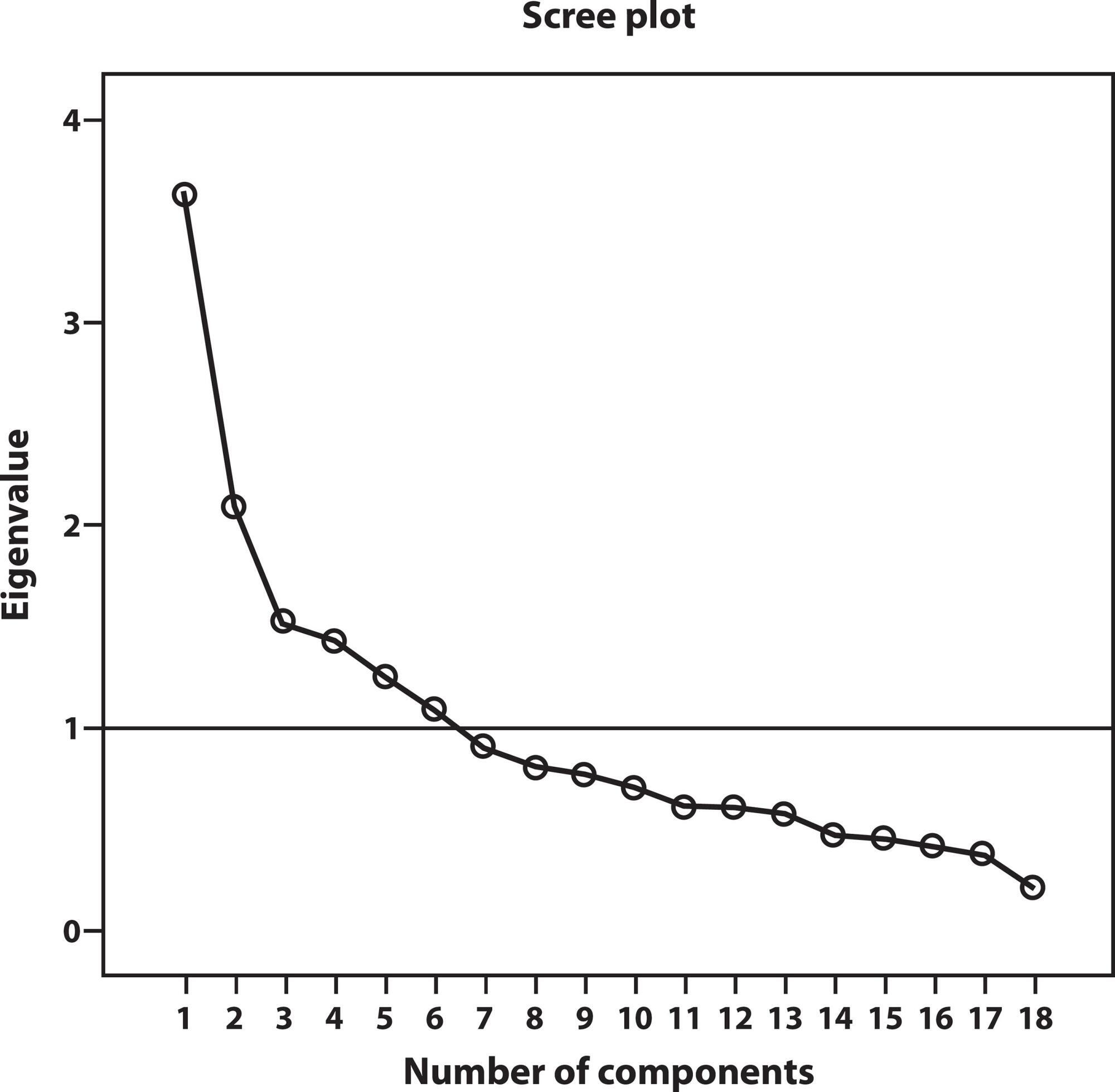
-
Development of middle-range theories in nursing
Revista Brasileira de Enfermagem. 2020;73(1):e20170893
02-10-2020
Abstract
Development of middle-range theories in nursing
Revista Brasileira de Enfermagem. 2020;73(1):e20170893
02-10-2020DOI 10.1590/0034-7167-2017-0893
Views0See moreABSTRACT
Objective:
To identify in the literature how Middle-Range Theories (MRT) are being developed in Nursing.
Method:
Integrative review on the databases Lilacs (Latin American and Caribbean Literature in Health Sciences), Scopus, Cinahl (Cumulative Index to Nursing and Allied Health Literature), Web of Science and PubMed portal, using the keywords middle range theory and nursing, as well its Portuguese correspondents (Lilacs), and the Boolean operator AND. The sample included 25 articles.
Results:
All articles presented concepts related to MRT. Most developed a synthesis picture. Some theories have formulated specific propositions, hypotheses, and names. Only 16 articles cited the methodological framework, while 22 used theories or models for theoretical foundation and 11 carried out literature reviews.
Final considerations:
The development of MRT included the presentation of fundamental concepts, synthesis, propositions, hypotheses and specific name. The MRT is recognized as a way of developing knowledge to guide the nursing practice.
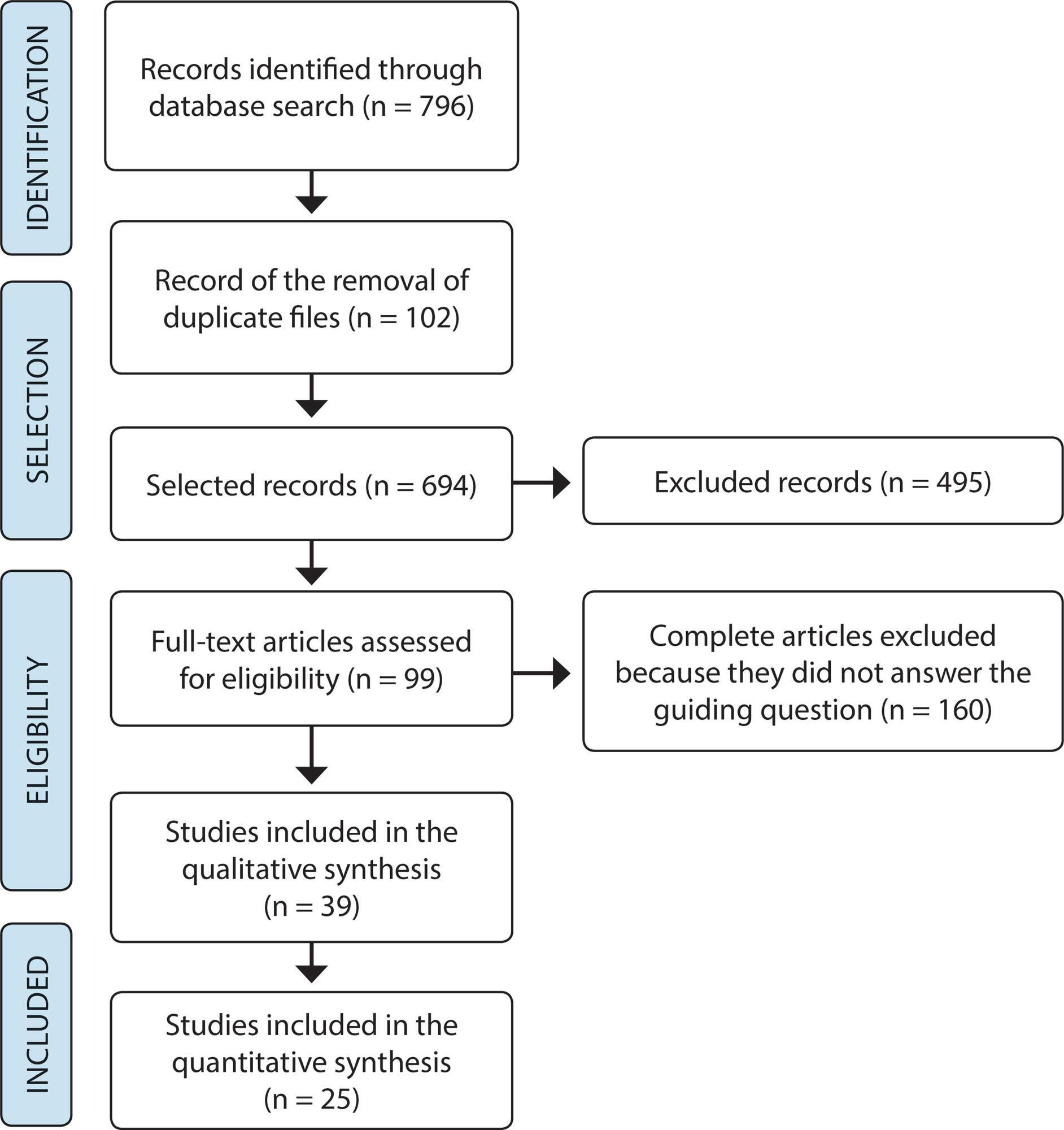
-
REVIEW
Assessment of patient safety culture in Brazilian hospitals through HSOPSC: a scoping review
Revista Brasileira de Enfermagem. 2021;74(6):e20201315
08-20-2021
Abstract
REVIEWAssessment of patient safety culture in Brazilian hospitals through HSOPSC: a scoping review
Revista Brasileira de Enfermagem. 2021;74(6):e20201315
08-20-2021DOI 10.1590/0034-7167-2020-1315
Views0ABSTRACT
Objectives:
to describe, from literature, the characteristics of patient safety culture in Brazilian hospitals that applied the Hospital Survey on Patient Safety Culture.
Methods:
this is a scoping review. A search was performed in the databases LILACS, PubMed, SciELO, CINAHL, Web of Science, Scopus and in the CAPES Dissertations and Theses Database in September and October 2020.
Results:
thirty-six studies were identified. Nine studies identified strengthened areas such as: “teamwork within the units”, “expectations of supervisor/boss and actions promoting safety”, “organizational learning”, “support of hospital management for patient safety” and “frequency of report of events”. As a critical area, the dimension “non-punitive response to error” was evidenced in 30 of 36 studies.
Conclusions:
the identification of areas of strength and critical areas of safety culture is relevant to encourage improvement of patient safety problems in an institution.
Keywords:HospitalsOrganizational CulturePatient SafetyQuality Indicators, Health CareQuality of Health CareSee more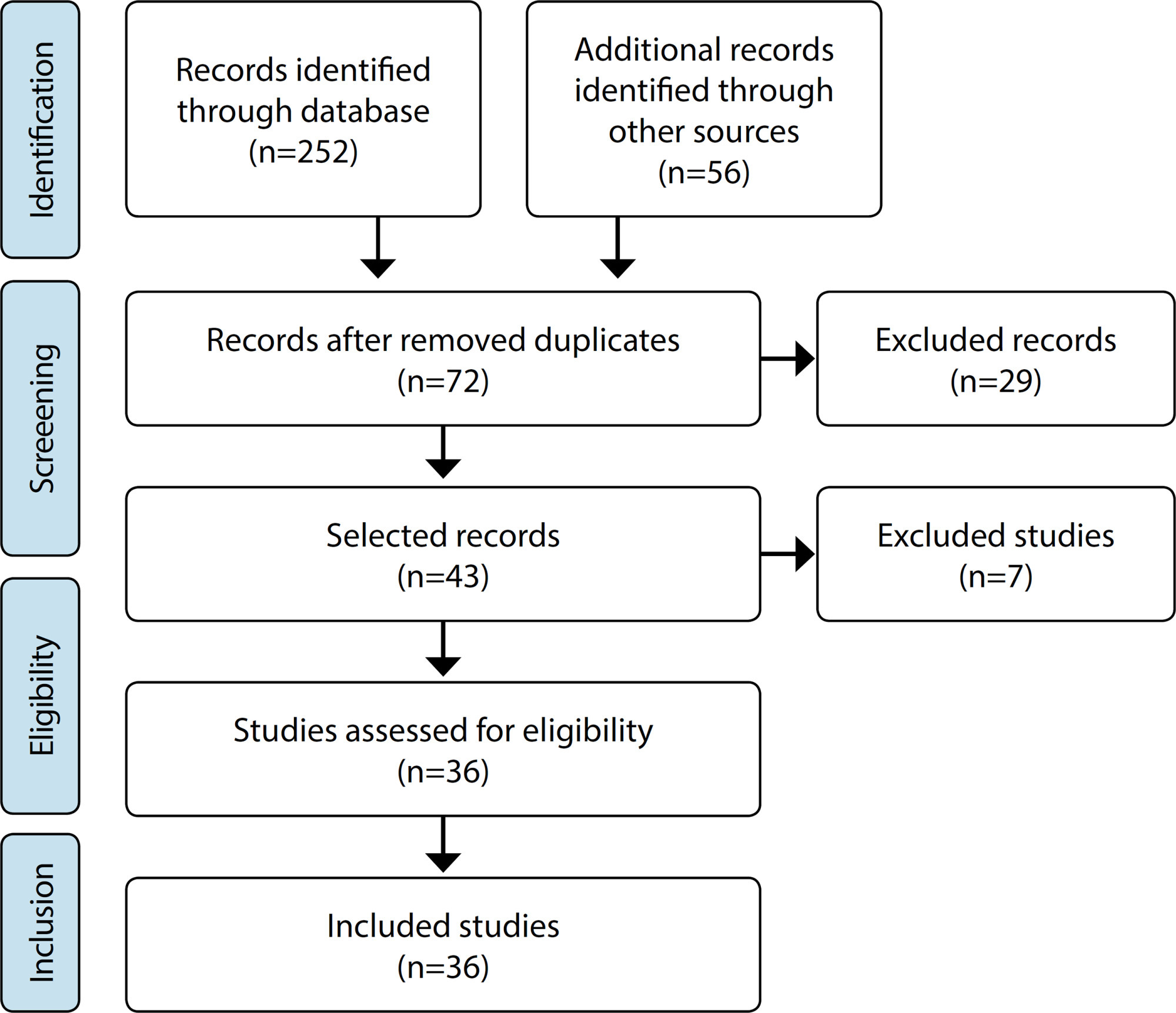
-
ORIGINAL ARTICLE
Low-laser light therapy in venous ulcer healing: a randomized clinical trial
Revista Brasileira de Enfermagem. 2022;75(3):e20210396
11-12-2022
Abstract
ORIGINAL ARTICLELow-laser light therapy in venous ulcer healing: a randomized clinical trial
Revista Brasileira de Enfermagem. 2022;75(3):e20210396
11-12-2022DOI 10.1590/0034-7167-2021-0396
Views0ABSTRACT
Objectives:
to compare the effect of adjuvant low-laser light therapy versus conventional treatment alone on venous ulcer healing.
Methods:
this is a randomized clinical trial with 40 patients randomized equally to a control group (topical and compressive treatment) and intervention group (adjuvant low-laser light therapy). Outcomes of interest were Wound Healing: Secondary Intention and Tissue Integrity: Skin & Mucous Membranes, as described in the Classification of Nursing Outcomes/NOC.
Results:
groups with similar sociodemographic and clinical characteristics. Eighty-two ulcers were assessed, with an average duration of 1 to 5 years, in 1,066 nursing consultations, with a statistically significant difference in the time and number of healed ulcers (intervention group). There was a significant improvement in the nursing outcomes under study and in eight clinical indicators.
Conclusions:
low-laser light therapy improves and reduces tissue regeneration time, contributing to advances in wound treatment.
Keywords:Low-Laser Light TherapyOutcome AssessmentStandardized Nursing TerminologyVenous UlcerWound HealingSee more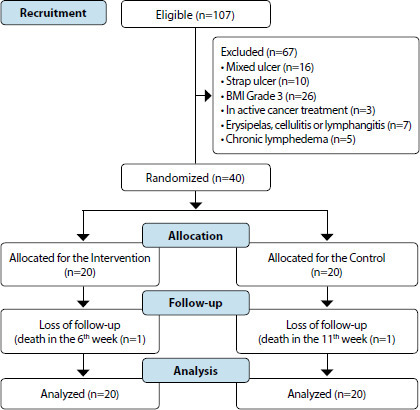
Search
Search in:
Nuvem de Tags
Aged (144) Atenção Primária à Saúde (239) COVID-19 (104) Cuidados de Enfermagem (269) Educação em Enfermagem (151) Educação em Saúde (139) Enfermagem (930) Estudos de Validação (131) Health Education (144) Idoso (208) Mental Health (149) Nursing (987) Nursing Care (306) Patient Safety (151) Primary Health Care (284) Qualidade de Vida (104) Quality of Life (106) Saúde Mental (145) Segurança do Paciente (150) Validation Studies (108)



